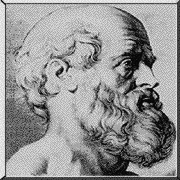 Hippocrates
was a Greek physician born in 460 BC on the island of Cos, Greece. He
became known as the founder of medicine and was regarded as the
greatest physician of his time. He based his medical practice on
observations and on the study of the human body. He held the belief
that illness had a physical and a rational explanation. He rejected
the views of his time that considered illness to be caused by
superstitions and by possession of evil spirits and disfavor of the
gods.
Hippocrates
was a Greek physician born in 460 BC on the island of Cos, Greece. He
became known as the founder of medicine and was regarded as the
greatest physician of his time. He based his medical practice on
observations and on the study of the human body. He held the belief
that illness had a physical and a rational explanation. He rejected
the views of his time that considered illness to be caused by
superstitions and by possession of evil spirits and disfavor of the
gods.
Hippocrates held the belief that the body must be treated as a whole and not just a series of parts. He accurately described disease symptoms and was the first physician to accurately describe the symptoms of pneumonia, as well as epilepsy in children. He believed in the natural healing process of rest, a good diet, fresh air and cleanliness. He noted that there were individual differences in the severity of disease symptoms and that some individuals were better able to cope with their disease and illness than others. He was also the first physician that held the belief that thoughts, ideas, and feelings come from the brain and not the heart as others of him time believed.
Hippocrates traveled throughout Greece practicing his medicine. He founded a medical school on the island of Cos, Greece and began teaching his ideas. He soon developed an Oath of Medical Ethics for physicians to follow. This Oath is taken by physicians today as they begin their medical practice. He died in 377 BC. Today Hippocrates is known as the "Father of Medicine".
Designed by: Josephine Delvey
References
Asimov, I., (1982). Asimov's Biographical Encyclopedia of Science and Technology (2nd Revised Edition). Garden City, New York: Doubleday.
Collier, P.F., Oath and Law of Hippocrates (1910). Harvard Classics Volume 38 (Online) gopher..//ftp.std.com//00/obi/book/Hippocrates/Hippocratic.Oath (November 11, 1997).
Debus, A.G., (1968) World Who's Who In Science: A Biographical Dictionary of Notable Scientists from Antiquity to the Present. Chicago: Marquis
Hippocrates. Encyclopedia Britannica (Online) http://www.eb.com/Hippocrates (November 12, 1997)
Hippocrates Web Page.Asclepeion Hospital - Athens (Online) http://www/forthnet.gr.asclepeion/hippo/htm (November 11, 1997)
Hippocrates: The "Greek Miracle" in Medicine. Ancient Medicine (Online) http://web1.ea.pvt.K12.pa.us/medant/hippint.htm#history (November 12, 1997)
Porter, R., (1994). The Biographical Dictionary of Scientists. Second Edition. New York: Oxford University Press.
Penfield, W., The Mystery of the Mind (1978). Princeton: Princeton University Press